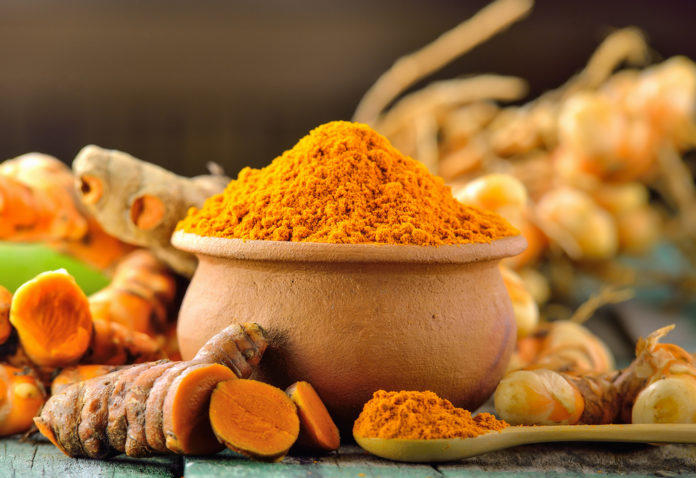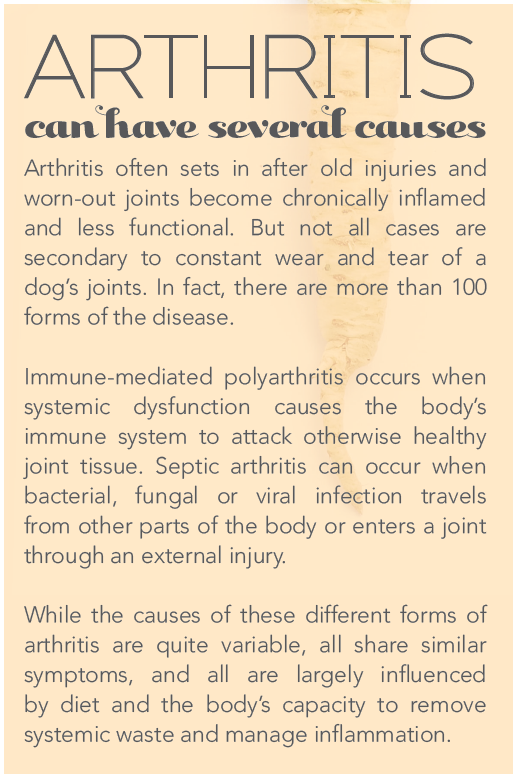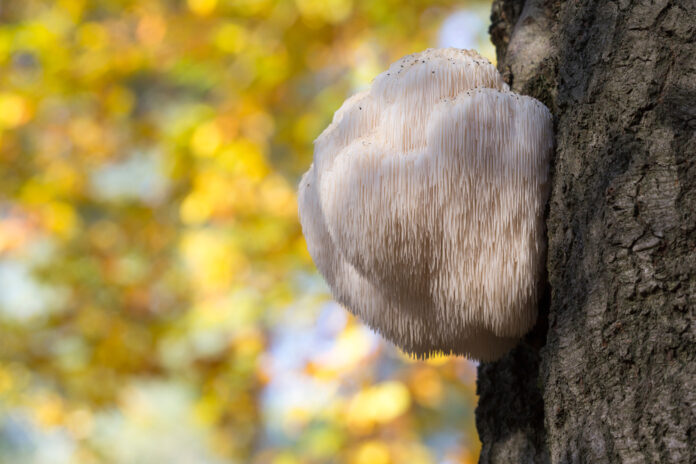5 herbs to help your arthritic dog

These healing herbs can help your arthritic dog by getting to the root of his arthritis while easing his pain.
If you have an arthritic dog, you’re not alone. Osteoarthritis is a common joint disease in aging dogs. Adding herbs to your dog’s arthritis regimen will help address underlying factors of the disease that glucosamine, chondroitin and other common joint supplements cannot. Herbs can reach deep into root causes of arthritis that go beyond the joints themselves. And they often bring faster relief from pain.
Address your dog’s diet first
Before any discussion about herbs or any other natural remedy can begin, diet must first be addressed. Poor quality or biologically-inappropriate food is perhaps the biggest contributor to arthritis. Dogs need high quality meats, fresh vegetables and the right mix of fats in their diet. If a dog is continuously eating foods laden with cheap meat by-products, legumes, too much grain or other substances that his body cannot effectively metabolize as real food for dogs, toxins will build up in the bloodstream faster than the liver and digestive system can process and eliminate them. This triggers an inflammatory response against the toxins, very similar to that of an allergy, resulting in more pain and reduced joint mobility.
Additionally, many dog foods are rich in Omega 6 fatty acids but deficient in Omega 3s. Both are required to maintain health, but too much Omega 6, which is predominant in grains and vegetable oils, can trigger the production of pro-inflammatory chemicals that exacerbate arthritis. Omega 3 fatty acids, however, which are derived primarily from fish oils and animal fats, do exactly the opposite, offering anti-inflammatory actions that can alleviate the painful symptoms of arthritis. Most bargain basement commercial dog foods list grains at the top of their ingredient panels, meaning that they contain too much pro-inflammatory Omega 6 and not enough Omega 3s.
The best approach is to feed a natural diet containing human-grade whole meats, whole vegetables and little or no grain. Adding a good fish oil supplement will ensure your companion is receiving the anti-inflammatory Omega 3 fatty acids she needs.
A probiotic/digestive enzyme supplement is also warranted, as this will improve digestion and help expedite elimination of food waste before it becomes an issue. Many enzyme supplements also contain bromelain, papain or other proteolytic enzymes that serve as powerful anti-inflammatory agents against arthritis.
Adding herbs to glucosamine, chondroitin and eggshell membrane
Most people who are confronting arthritis in themselves or their animals will likely be led to glucosamine sulfate and chondroitin as part of their relief plan. These supplements can be very effective toward slowing the progression of osteoarthritis and may be helpful for maintaining joint mobility, especially if used over a long term.
Another up and coming anti-arthritic joint supplement is eggshell membrane (EM). Recent studies have shown that EM can significantly improve multiple aspects of inflammatory arthritis, including inflammation, pannus, cartilage damage, bone resorption and periosteal bone formation. In a 2016 study published by the National Institutes of Health, dogs supplemented with 13.5 mg/kg (6 mg/lb) of eggshell membrane powder just once daily experienced reduced joint pain and improved joint function within one week, and demonstrated lasting improvement in joint pain and improved quality of life after six weeks.
Adding herbs to your dog’s arthritis regimen will do even more to help. Here’s a list of my favorites:
1. Turmeric (Curcuma longa)
Dozens of studies show that this amazing member of the ginger family can be very effective at quickly reducing the pain and inflammation of arthritis. A few studies compare its effectiveness to NSAID drugs like ibuprofen, acetaminophen or carprofen (brand name Rimadyl). However, unlike NSAIDs, which may damage the liver with long-term use, turmeric does the opposite. A powerful antioxidant, turmeric serves to protect and strengthen the liver and its function, which is vitally important to its role of removing the systemic waste that would otherwise contribute to arthritis.
For prevention and daily health maintenance, simply sprinkle ½ to 1 teaspoon of powdered turmeric on your companion’s food. For your arthritic dog, use a turmeric product that has been “standardized” to contain 80% to 90% curcuminoids — the most active components of turmeric.
The biggest problem with turmeric and the curcuminoids it contains is that it is poorly soluble and difficult for the body to absorb. However, adding a small percentage of black pepper, or its component piperine, greatly improves the absorption of curcuminoids into the body, thus enhancing turmeric’s effectiveness. A typical daily dose of a turmeric supplement (80% to 90% curcuminoids) optimized with black pepper or piperine range from 15 mg/lb to 30 mg/lb of the dog’s body weight.
 2. Alfalfa (Medicago sativa)
2. Alfalfa (Medicago sativa)
At least 10% to 20% of human subjects experience a dramatic reduction of painful symptoms with the daily use of alfalfa. Traditional uses in animals have led to similar results. This effect is likely attributable to alfalfa’s impressive chemical array of saponins, beta-sitosterol, stigmasterol, alpha-spinasterol, flavonoids, coumarins, alkaloids, beta-carotene, chlorophyll, octacosanol and amino acids.
For arthritis and other inflammatory diseases of the joints, alfalfa can bring long-term relief to dogs that receive it as a daily food supplement. I recommend an alcohol-free tincture of the herb. A typical dose regimen is 1 ml twice daily for dogs under 30 lbs; and up to 2 ml twice daily for larger dogs.
3. Parsley root
Parsley root is known by herbalists as an excellent diuretic that’s especially useful in the treatment of rheumatoid conditions. It is believed to help with the elimination of uric acid, which would otherwise contribute to the buildup of painful crystals in the joints.
Because of its diuretic properties, parsley root is very useful in cases of arthritis compounded by poor waste elimination — a problem that often results from a poor diet. For these purposes, dogs can be given a tea made from the dried or freshly grated root (1 tbsp to 2 tbsp in 8 oz water), or a tincture can be used (1ml to 2 ml per 30 lbs of the dog’s body weight).
4. Yucca root
In a study conducted at the beginning of the 20th century, “saponin extract” from the “desert yucca plant” brought safe and effective relief from pain and inflammation in human arthritis patients, when they were given the extract four times daily over an extended period.
I have seen similar results in dogs. Many of the naturopaths, veterinarians and animal nutritionists I have worked with, who use yucca in their practices, claim a 50% to 80% success rate in relieving patients suffering from either osteoarthritis or rheumatoid arthritis.
Yucca contains saponin compounds called sarsasapogenin and smilagenin. These phytosterol constituents are believed useful for relieving inflamed joints in animals with arthritis and other rheumatoid diseases. More importantly, these two compounds aid in the assimilation of important minerals and vitamins by promoting increased passage of critical nutrients through the intestinal walls.
A pinch of yucca root powder or a 1 ml squirt of an alcohol-free tincture added per one pound of food is all you need.
5. Boswellia (Boswellia serrata)
Also known as frankincense bush, boswellia has become somewhat of a gold standard for reducing pain and inflammation in the arthritic dog. The extract is made from the resins of the bush, which is native to the Middle East. Although boswellia is quite bitter and can be difficult to feed, it is quite effective at bringing quick relief.
I view this herb as a natural direct replacement for non-steroidal drugs, with little risk of liver toxicity. It can be used in place of hepatotoxic drugs like carprofen whenever practical, but remember this: even though boswellia is a safe natural remedy, it can only address inflammation and pain symptoms, not the underlying causes of arthritis. For lasting results, begin with improvements to diet, and supplement with supplements such as glucosamine and/or chondroitin, and herbs like turmeric and alfalfa, which will also support healthy liver function and waste elimination.
There is no cure for arthritis, but there are many things you can do to slow its progression, manage pain, and keep your arthritic dog chasing butterflies into his golden years.



